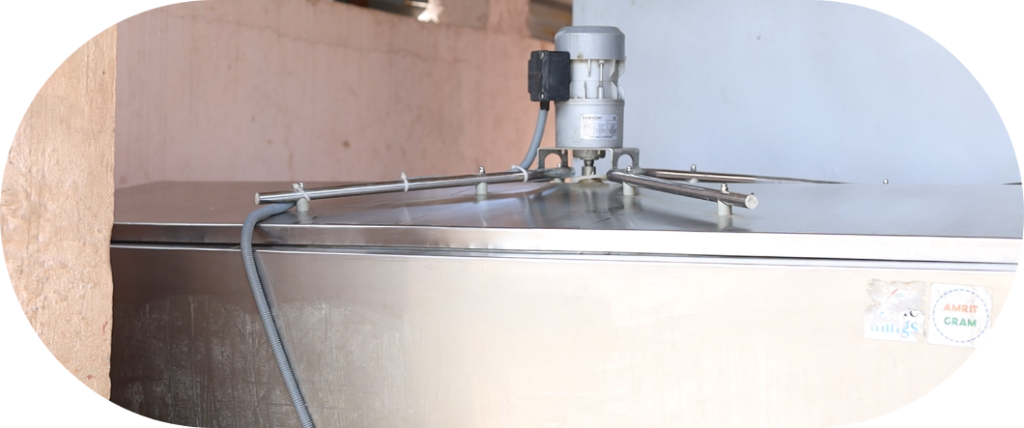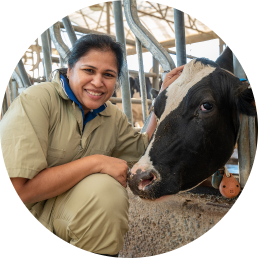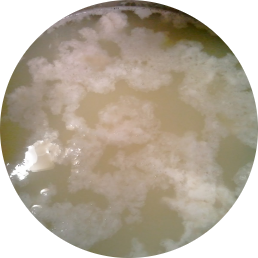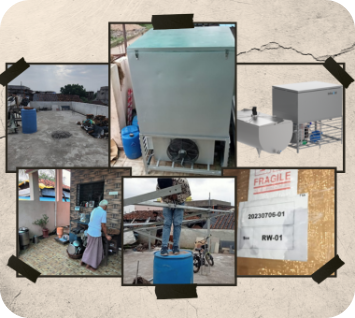
Dairy farming, when integrated with modern technologies and sustainable practices, can serve as a transformative intervention for a smart model village. The localized production of dairy products, sustainable livestock management, technological innovations, value addition, and waste reduction collectively contribute to a resilient and thriving community. As the world navigates the challenges of food security, environmental sustainability, and economic growth, the inclusion of a forward-looking dairy industry in a smart model village exemplifies the potential for harmonious coexistence between agriculture, technology, and community well-being.
Among the key interventions that can drive this vision forward, the incorporation of a modern and efficient dairy industry holds significant promise.
Under dairy an an intervention, Amrit Gram is working on the following:
Revolutionizing cattle management with a suite of high-tech features designed to maximize productivity and enhance cattle health, with the help of Timely Heat Detection, Optimized Artificial Insemination, Early Health Issue Detection and Milk Yield Tracking and Analysis.

In the rural expanses of India, cattle monitoring presents a unique set of challenges that can significantly impact livestock welfare and, consequently, the livelihoods of farmers. Key issues include:

Many rural regions in India grapple with a scarcity of modern technologies and infrastructure, a shortfall that hampers the implementation of advanced cattle monitoring systems. This challenge is compounded by the absence of reliable internet connectivity, unstable power supply, and limited access to veterinary services. According to the International Fund for Agricultural Development, nearly 70% of rural Indian households lack internet access, hindering digital solutions for cattle monitoring.

Cattle monitoring in rural India is predominantly manual, a practice that is not only labor-intensive but also susceptible to errors. Farmers often struggle to efficiently track aspects such as individual animal health, nutrition, and reproductive cycles. According to a study published in the Journal of Dairy Science, manual monitoring can result in accuracy rates as low as 55%, underscoring the need for more reliable methods.

The dearth of robust disease surveillance systems in rural areas impedes the swift detection and containment of livestock disease outbreaks. Given that livestock diseases can proliferate rapidly and inflict severe damage on community livelihoods, this is a significant concern. The Food and Agriculture Organization reports that livestock diseases cause a loss of at least 20% of livestock productivity globally, a percentage that is likely higher in areas with weak surveillance systems.

Rural regions frequently face a shortage of qualified veterinarians, leading to insufficient healthcare for cattle. This shortage can lead to untreated illnesses, diminished productivity, and increased mortality rates among livestock. According to the Indian Veterinary Association, there is a shortfall of about 50,000 veterinarians in India, which severely impacts rural areas.

Jio Gau Samriddhi revolutionizes cattle management with a suite of high-tech features designed to maximize productivity and enhance cattle health. Here’s how Jio Gau Samriddhi can make your cattle management tasks easier and more efficient:
Never miss a heat cycle again! Jio Gau Samriddhi leverages high-precision algorithms to monitor your cows’ cycles, providing timely heat alerts directly to your device. Sit back and let our advanced technology shoulder the burden of tracking for you.
Our 'Optimal Time for AI' tool guides you to the perfect moment for artificial insemination, avoiding costly mistimed procedures.
Eliminate the guesswork in timing artificial insemination (AI) procedures. Our ‘Optimal Time for AI’ feature helps you pinpoint the ideal time for insemination, saving you time and money spent on mistimed AI procedures.
Healthy cows are happy cows! Our system provides early warnings for potential health issues, enabling you to identify and address any concerns even before symptoms become apparent.
Managing the daily milk yield of your cows has never been easier. Our user-friendly milk yield interface allows you to record and track yield data effortlessly. Plus, our system analyzes yield trends and notifies you if a cow’s production falls below a certain threshold.
We understand the importance of attentive care during a cow’s pregnancy. With our system, you’ll receive alerts and reminders about key events throughout the gestation period, ensuring your pregnant cows never miss out on the care they need.


Regular monitoring acts as the first line of defense in the early detection of health issues. The prompt intervention it enables leads to timely treatment and care, contributing to improved cattle health and a reduction in animal suffering. According to a study conducted by the American Journal of Veterinary Research, early disease detection through regular monitoring can decrease cattle mortality rates by up to 20%, promoting overall welfare for the animals.
Regular monitoring plays a pivotal role in disease prevention and control by identifying early signs of diseases or infections. By allowing for the implementation of preventive measures, it reduces the risk of disease outbreaks within the cattle population. The Royal Veterinary College reports that early disease detection and control through consistent monitoring can lead to a decrease in disease spread by up to 30%, contributing to higher survival rates and minimizing the spread of contagious diseases.
Monitoring enables cattle owners to keep a close eye on both the dietary needs and feeding patterns of their livestock. This ensures the cattle receive nutrition that is not only adequate but also tailored to their needs, resulting in better growth rates and reproductive performance. A study published in the Journal of Dairy Science suggests that optimized feeding practices, guided by regular monitoring, can enhance cattle weight gain by 10-15% and improve reproductive performance by up to 20%.
Improvement of milk quality and shelf life by minimizing spoilage and bacterial growth, large savings in power expenses in comparison to traditional chilling systems.


Rural Indian farmers face considerable challenges due to the lack of solar milk chillers. And they struggle to maintain the freshness and quality of milk.

Without a solar milk chiller, farmers are unable to effectively store milk for longer durations, limiting their ability to access distant markets or negotiate better prices.

The lack of a cooling system hampers the diversification of dairy products, as farmers are unable to produce value-added items such as cheese, butter, or yogurt, which require precise temperature control.

Milk is highly perishable and prone to spoilage in the absence of proper cooling, leading to financial losses for farmers.





We believe that together, we can make a real impact. Join us today and take a step towards building a better tomorrow!

Rite Water is excited to introduce Amrit Gram™, a ground-breaking concept aimed at creating self-sufficient, self-sustaining, and future-ready model villages in India, to the recipient. This initiative is aligned with the vision of the Honorable Prime Minister of India, Shri Narendra Modi, for a utopian golden period in India called “Amrit Kaal.”
© 2023 Amrit Gram. All rights reserved.